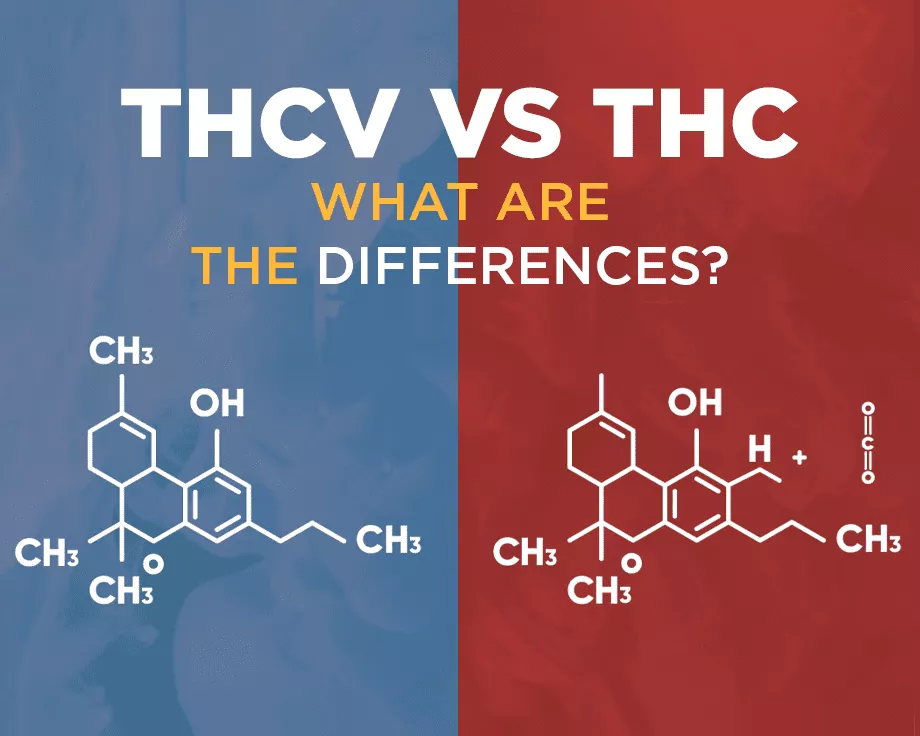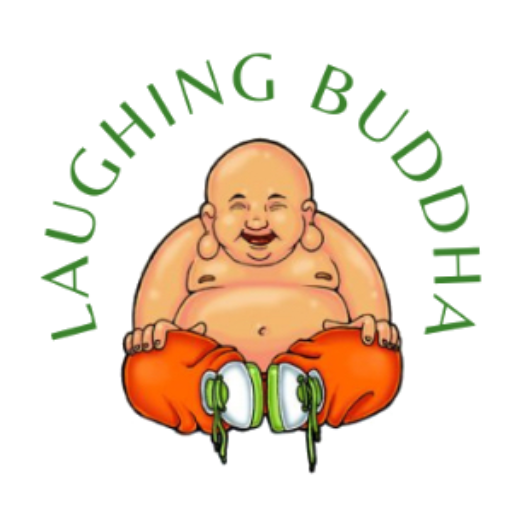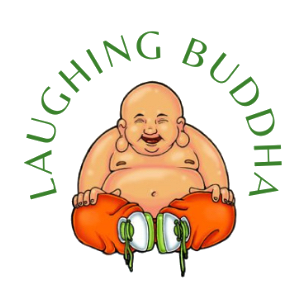Blog
THCV vs. THC: What Are The Differences?

Sometimes, with how many cannabinoids there are on the market, it can feel difficult trying to understand which one does what — especially when they sound so similar. If you’ve come across THC and THCV recently, you’ve probably been curious about the differences behind these unique cannabinoids. After all, their names are practically identical, so what makes them different?
Below, we’re breaking the stark differences between THCV and THC, showing you how they contrast.
Key Differences Between THCV and THC
Before we get into the details of what THCV and THC are, let’s quickly discuss the key differences between these two cannabinoids.
Primarily, the most significant contrasts here are in cannabinoids. They even have different legal regulations surrounding them. Again, we’ll discuss these differences in detail later, but it’s important to keep these juxtapositions in mind.
Because of these key differences, you don’t want to mix up THCV for THC or vice versa. Thus, you must remember that even though these cannabinoids sound very similar, they don’t act the same way or produce the same outcomes.
Now that we’ve established the basics let’s get into the nitty-gritty details behind THCV and THC.
What Does THC Stand For?
THC stands for tetrahydrocannabinol and it is the most abundant psychoactive cannabinoid found in the cannabis plant. THC is abundant in marijuana but only available in small amounts within hemp due to the 2018 Farm Bill.
The THC cannabinoid is the best known out of all. Generally, when people talk about THC, they refer to delta 9 THC. However, other THC derivatives exist, such as delta 8 and delta 10, so it’s best to clarify when talking about your cannabis compounds.
You can find THC products of varying types, both hemp and marijuana-derived. However, you can only purchase marijuana-derived THC products from licensed dispensaries in states that have legalized cannabis. If you’re not in one of those places, you can stick to buying hemp-derived THC products that are just as good.
What Does THCV Stand For?
Not to be confused with THC, THCV stands for tetrahydrocannabivarin, and it is yet another cannabinoid within cannabis. It is not nearly as abundant as THC itself, but you can often find it in small amounts alongside THC. Typically, African Sativa strains are going to have the highest amount of THCV, but some growers have started learning how to cultivate THCV-rich flowers, too.
Most THCV products come from hemp, making them federally legal across the United States. In all states, you can readily buy THC-V online through reputable sources like ATLRx. Like THC, you can find THCV products in various forms, such as vapes, tinctures, gummies, and even flowers.
What Exactly Is THC?
Now that you know what THC is, what exactly is this cannabinoid?
For starters, a cannabinoid is a chemical compound naturally found within the cannabis plant. Interestingly enough, our bodies make our version of this compound called endocannabinoids, which work with the endocannabinoid system (ECS) in the body.
So, THC is one of the dozens of cannabinoids within the cannabis plant. The THC cannabinoid is most popular because of its effects.
What Is THCV?
Just like THC, THCV is one of many cannabinoids in the cannabis plant. To get technical, THCV is considered a homolog of THC, and it has a propyl side chain — not a pentyl group like THC. This difference in structure between THC and THCV gives the two cannabinoids different results.
You don’t have to know what these chemical structures mean by heart. Instead, what’s most important to remember is that THCV and THC have two different chemical compositions, and the main difference in the cannabinoids comes from these different structures.
The compositions also directly affect how the cannabinoids work and whether or not they’re agonists or antagonists to the cannabinoid receptors in our ECS.

How Does THC Work?
Remember that endocannabinoid system we mentioned earlier? Well, the ECS is made up of two receptors: Cannabinoid 1 (CB1) and Cannabinoid 2 (CB2) receptors. CB1 receptors are primarily located in the central nervous system, while CB2 receptors are in the peripheral nervous system. Your body’s natural endocannabinoids bind to these receptors to help regulate various bodily functions — and so does THC.
How Does THCV Work?
THCV, surprisingly, works almost the opposite of THC. While THC works alongside both CB1 and CB2 receptors, THCV is a “neutral antagonist” and actually works to prevent them from activating. While this may sound counter-productive, this can significantly benefit the system in various ways depending on the person. Thus, most people find that THCV has more apparent therapeutic results than psychoactive ones.
The way that THCV works is still being looked into today, as the cannabinoid is complex and still acts uniquely in each system. But, for now, it appears as though THCV and THC work almost oppositely; but when consumed together, they can provide widespread effects.
Will THC Make You Fail a Drug Test?
Unfortunately, THC will definitely make you fail a drug test. Standard drug tests are looking specifically for THC; thus, they will pick up any traceable amount of THC in the body, causing you to fail.
If you have a drug test coming up in the future, it is best to avoid THC for as long as you can beforehand. The longer you go, the better chance you have at totally clearing your system and coming out with a negative drug test.
Will THCV Make Me Fail a Drug Test?
Even though THCV is not delta 9, there’s a chance that the cannabinoid can still cause you to fail a drug test. Again, this is because the drug test is looking for THC and THC metabolites. Because THCV is so closely related to THC, the drug test is likely to mistake the cannabinoid for THC, and say you’re positive for cannabis.
Like with THC, it will be in your best interest to avoid THCV and any THC products until your drug test has come and passed. You don’t want to risk accidentally failing it, especially for a cannabinoid that’s not highly intoxicating.
THC Legalization
While reading all of this about THC and THCV, you might be asking yourself, “Is THC even legal?” Well, it’s a bit complicated.
Technically, the 2018 Farm Bill legalized hemp and hemp products as long as they contain 0.3% THC or less by weight. Thus, hemp-derived products are legally allowed to have small amounts of THC. Some states like Idaho and Kansas have placed bans on any amount of THC, though, so it is still up to the state’s discretion.
Marijuana-derived THC, however, is federally illegal. You can only obtain marijuana-derived THC products from licensed dispensaries in places with medical or recreational cannabis.
Is THCV Legal?
One of the best things about THCv is its legality. The cannabinoid is federally legal under the 2018 Farm Bill.
Like other cannabinoid products, THCV has to come from hemp and cannot contain more than 0.3% THC. As long as it follows these regulations, it is federally legal and also legal in 41 different states.
Understanding: THCV Vs. THC FAQ’s
Before we let you go, we wanted to answer a few more frequently asked questions regarding THCV and THC.
Is THCV Stronger Than THC?
No, THCV is not stronger than THC. THC binds to the CB1 and CB2 receptors in the body, allowing us to experience strong effects. On the flip side, THCV is a neutral antagonist and that works to block these receptors.
Does THCV Block THC?
Research suggests that because of THCV’s properties, it does block THC from working by competing for endocannabinoid receptors. This is because it prevents the cannabinoid receptors from activating.
What Are the Boiling Points of THCV and THC?
The boiling points of THCV and THC are not the same! To properly vaporize THCV, it needs to be at a boiling point of 428°F or 220°C — incredibly high.
The boiling point of THC is a bit lower, at 315°F or 157°C. It’s essential to keep these temperatures in mind when dabbing or vaping.
Key Takeaways: THCV Vs. THC
Now, it’s quite obvious that THCV and THC are two unique cannabinoids that offer different experiences. But both of these compounds are incredible for their reasons, with customers of all backgrounds loving either one.
If you’re hoping to buy THC-V online, in products like THCV Gummies 10 mg., then ATLRx has you covered. Our online store is full of the best, highest-quality THCV and THC products on the market — and we’ll ship them straight to your door. So, whether you’re interested in THC or THCV, ATLRx has the perfect cannabinoid options for you. You just have to start browsing.

